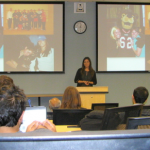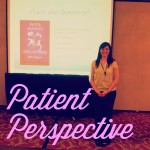Watch Now: How a Patient Helped Define A New Clinical Endpoint with FDA
How did I catch the “Advocacy Bug”? Why is the patient voice important? Watch my TED-style talk on the power of narcolepsy advocates working directly with FDA to build a brighter future.
I gave this speech to over 300 clinical trial development experts in the pharmaceutical industry at the Disruptive Innovations Conference in Boston, MA on Sept. 11, 2014. As the “patient presenter” for this conference, I felt a responsibility to make a meaningful impact on behalf of all patients – to give a passionate plea for the importance of the patient voice.
I was honored to showcase the narcolepsy community’s FDA Initiative and advocate for greater patient representation in clinical research development. I hope I made you proud!
Also, my interview on debunking the narcolepsy myth, Project Sleep and the FDA initiative:
Download my Speaker’s Resume
 |
 |
 |
 |
OTHER RECENT SPEAKING ENGAGEMENTS:
UPCOMING SPEAKING ENGAGEMENTS:
- Patients as Partners in Philadelphia, PA (March 16, 2015)
- Narcolepsy Australia Patient Conference in Queensland, Australia (May 1-3, 2015)
- Nova Southeastern College of Medicine and Health Professions Division in Ft. Lauderdale, FL (May 7-9, 2015)

Interesting Julie. You’re a “cataplexy first” narcoleptic. I agree — all of the current medications used to treat the condition are unsatisfactory. I think the disorder is simply too complex for any single medication. Replacing orexin won’t work because the receptors that respond to it gradually diminish over time when it’s absent. There are “feedback” circuits and autoreceptors that self-regulate it as well. A pill won’t be able to do this. The only thing I think researchers can do is map out the entire orexinergic system and how it interacts with other neurotransmitters, but it interacts with so many a single drug can’t target them all and the inhibitory feedback. I honestly don’t know what can be done, as amphetamine stimulants cause too many cardiovascular problems over the long term, and Xyrem, well, it just isn’t the wonder drug it’s been made out to be. I am in Canada and I know that the new histamine boosting pitolisant is based on the principle of another drug that is available up here. Unfortunately, it’s very weak. Other than that, I haven’t seen much in the way of new research.